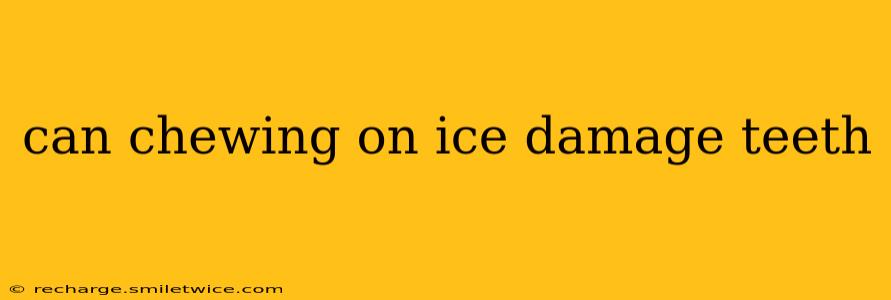Can Chewing on Ice Damage Teeth? A Comprehensive Guide
Chewing on ice may seem harmless, but the truth is, this seemingly innocuous habit can significantly damage your teeth. The hard, brittle nature of ice puts considerable stress on your enamel, the protective outer layer of your teeth. This can lead to a range of problems, from minor chips and cracks to more serious issues. Let's delve deeper into the potential consequences.
What Happens When You Chew Ice?
When you bite down on ice, the force exerted on your teeth can be surprisingly high. This pressure can cause microfractures in your enamel, which are tiny cracks invisible to the naked eye. Over time, these microfractures can accumulate, weakening your enamel and making your teeth more susceptible to:
- Chipped teeth: Larger pieces of ice can easily chip or break away portions of your enamel, leading to noticeable damage.
- Cracked teeth: The force of chewing ice can cause cracks to extend deep into the tooth's structure, potentially reaching the dentin (the layer beneath the enamel) or even the pulp (the innermost part containing nerves and blood vessels).
- Increased tooth sensitivity: Damage to the enamel exposes the underlying dentin, making your teeth more sensitive to hot, cold, sweet, or sour foods and drinks.
- Weakened enamel: Repeated exposure to the hard surface of ice gradually weakens your enamel, making it more vulnerable to cavities and other dental problems.
How Can I Tell if I've Damaged My Teeth from Chewing Ice?
The effects of chewing ice aren't always immediately apparent. However, you should watch out for the following signs:
- Sudden tooth pain: Sharp, shooting pain, particularly when consuming hot or cold beverages, is a key indicator of potential enamel damage.
- Visible chips or cracks: Inspect your teeth carefully for any noticeable breaks or imperfections in the enamel.
- Increased sensitivity: If your teeth are suddenly more sensitive to temperature changes or certain foods, it could be a sign of underlying damage.
- Discoloration: Damaged enamel may appear discolored or stained more easily than healthy enamel.
Is it Only Ice That Damages Teeth?
While ice is a notorious culprit, other hard substances can similarly damage your teeth. These include:
- Hard candies: Similar to ice, the hardness of hard candies can exert significant pressure on your teeth.
- Nutshells: Biting into hard nutshells carries a high risk of cracking or chipping your teeth.
- Pencils: Biting on pencils or pens is a dangerous habit that can cause significant dental damage.
How Can I Protect My Teeth from Ice Damage?
The best way to protect your teeth is to avoid chewing ice altogether. If you have a strong craving for something cold, try these alternatives:
- Crushed ice: Crushed ice is less likely to cause damage compared to large ice cubes.
- Frozen fruit: Frozen fruits, such as grapes or berries, provide a refreshing and healthy alternative.
- Ice pops or popsicles: These offer a cold treat without the risk associated with chewing hard ice.
What Should I Do If I Think I've Damaged My Teeth?
If you suspect that you've damaged your teeth from chewing ice or any other hard substance, it's crucial to see a dentist immediately. Early intervention can often prevent more significant problems and preserve the health of your teeth. A dentist can diagnose the extent of the damage and recommend appropriate treatment, which may include fillings, crowns, or other restorative procedures.
By understanding the risks associated with chewing ice and adopting preventive measures, you can protect your teeth and maintain a healthy, confident smile for years to come. Remember, your oral health is paramount!
